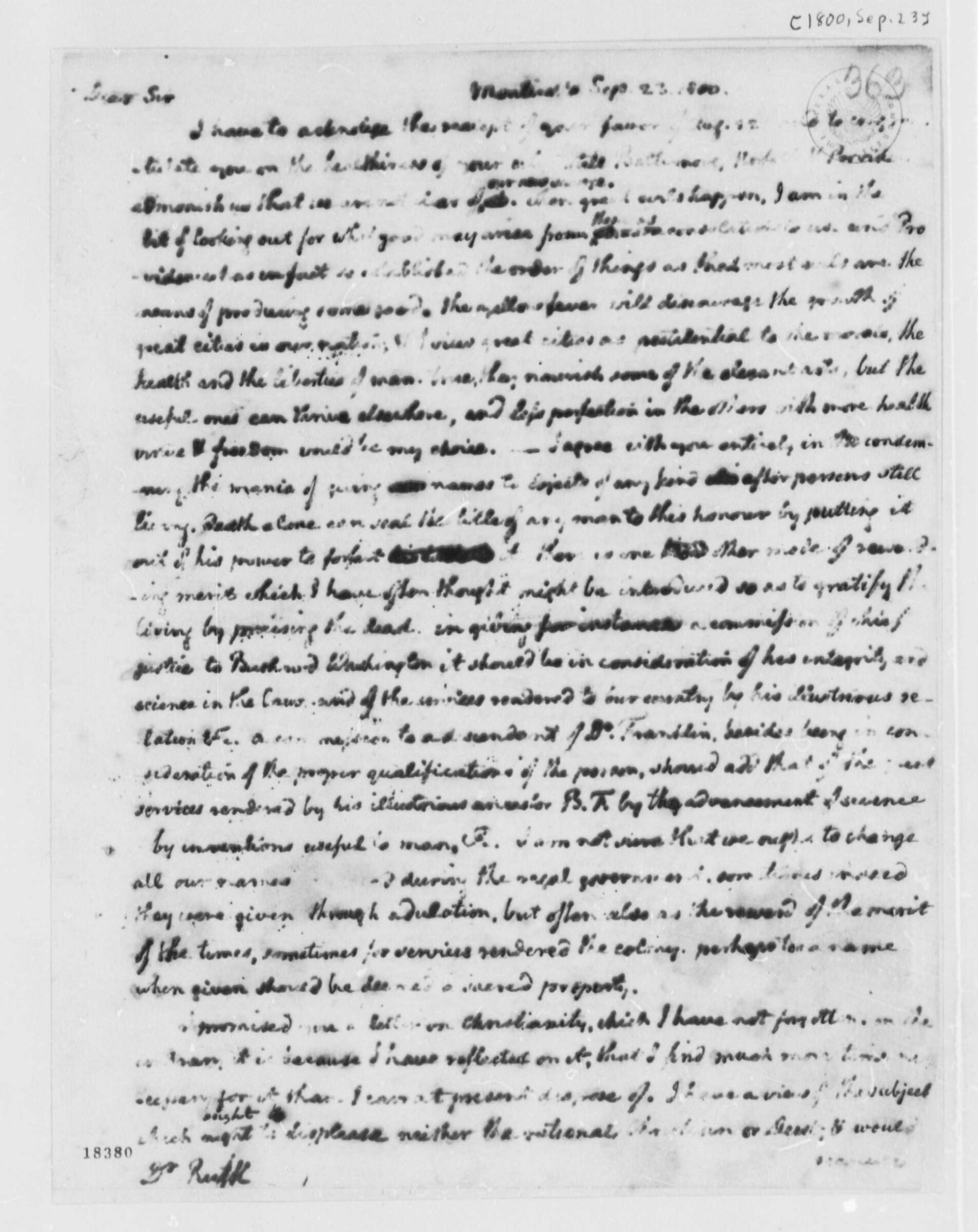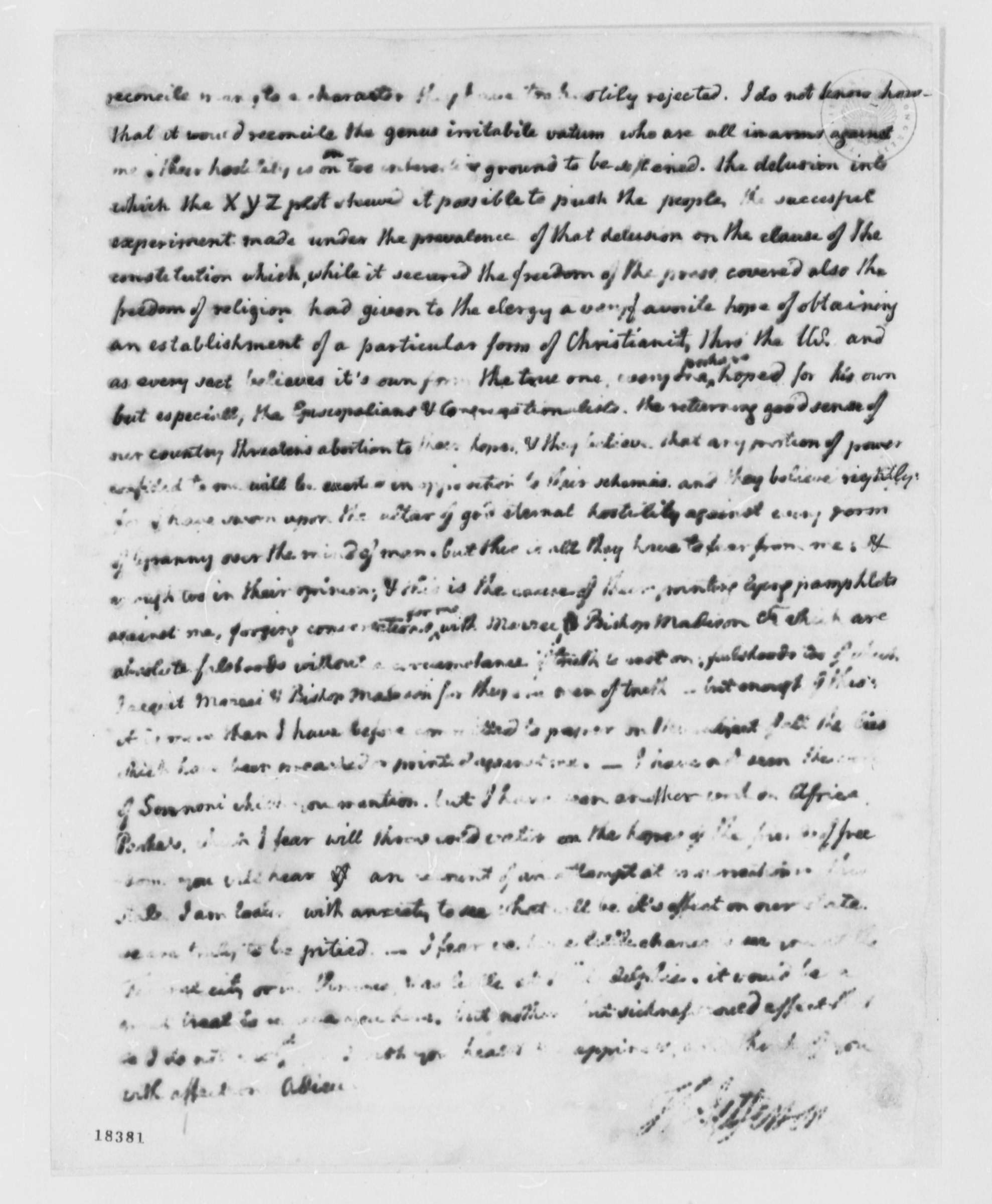John William Draper on the Demise of Religion
Alexander Pope on the Paradox of Man
Know then thyself, presume not God to scan, ¶ The proper study of mankind is Man. ¶ Plac’d on this isthmus of a middle state, ¶ A being darkly wise, and rudely great: ¶ With too much knowledge for the sceptic side, ¶ With too much weakness for the stoic’s pride, He hangs between; in doubt to act, or rest; ¶ In doubt to deem himself a god, or beast; ¶ In doubt his mind or body to prefer; ¶ Born but to die; and reas’ning but to err: ¶ Alike in ignorance, his reason such, ¶ Whether he thinks too little or too much; ¶ Chaos of thought and passion, all confus’d; ¶ Still by himself abus’d or disabus’d; ¶ Created half to rise and half to fall; ¶ Great lord of all things, yet a prey to all; ¶ Sole judge of truth, in endless error hurl’d; ¶ The glory, jest, and riddle of the world!
Thomas Paine on Revelation and Redemption
The dogma of the redemption is the fable of priest-craft invented since the time the New Testament was compiled, and the agreeable delusion of it suited with the depravity of immoral livers. When men are taught to ascribe all their crimes and vices to the temptations of the Devil, and to believe that Jesus by his death rubs all off, and pays their passage to heaven gratis, they become as careless in morals as a spendthrift would be of money, were he told that his father had engaged to pay off all his scores. It is a doctrine not only dangerous to morals in this world, but to our happiness in the next world, because it holds out such a cheap, easy, and lazy way of getting to heaven, as has a tendency to induce men to hug the delusion of it to their own injury. ¶ But there are times when men have serious thoughts, and it is at such times, when they begin to think, that they begin to doubt the truth of the Christian Religion; and well they may, for it is too fanciful and too full of conjecture, inconsistency, improbability, and irrationality, to afford consolation to the thoughtful man. His reason revolts against his creed. He sees that none of its articles are proved, or can be proved. He may believe that such a person as is called Jesus (for Christ was not his name) was born and grew to be a man, because it is no more than a natural and probable case. But who is to prove he is the son of God, that he was begotten by the Holy Ghost? Of these things there can be no proof; and that which admits not of proof, and is against the laws of probability and the order of nature, which God himself has established, is not an object for belief. God has not given man reason to embarrass him, but to prevent his being imposed upon.
Thomas Paine on the Bible
It is to be hoped some humane person will, on account of our people on the frontiers, as well as of the Indians, undeceive them with respect to the present the Missionaries have made them, and which they call a good book, containing, they say, the will and laws of the GREAT SPIRIT. Can those Missionaries suppose that the assassination of men, women, and children, and sucking infants, related in the books ascribed to Moses, Joshua, etc., and blasphemously said to be done by the command of the Lord, the Great Spirit, can be edifying to our Indian neighbours, or advantageous to us? Is not the Bible warfare the same kind of warfare as the Indians themselves carry on, that of indiscriminate destruction, and against which humanity shudders? Can the horrid examples and vulgar obscenity with which the Bible abounds improve the morals or civilize the manners of the Indians? Will they learn sobriety and decency from drunken Noah and beastly Lot ; or will their daughters be edified by the example of Lot’s daughters? Will the prisoners they take in war be treated the better by their knowing the horrid story of Samuel’s hewing Agag in pieces like a block of wood, or David’s putting them under harrows of iron? Will not the shocking accounts of the destruction of the Canaanites, when the Israelites invaded their country, suggest the idea that we may serve them in the same manner, or the accounts stir them up to do the like to our people on the frontiers, and then justify the assassination by the Bible the Missionaries have given them? Will those Missionary Societies never leave off doing mischief?
Thomas Paine on the Sabbath, Creation and Calvinism
The word Sabbath, means REST, that is, cessation from labour, but the stupid Blue Laws of Connecticut make a labour of rest, for they oblige a person to sit still from sunrise to sunset on a Sabbath day, which is hard work. Fanaticism made those laws, and hyprocrisy pretends to reverence them, for where such laws prevail hypocrisy will prevail also. ¶ One of those laws says, “No person shall run on a Sabbath-day, nor walk in his garden, nor elsewhere, but reverently to and from meeting.” These fanatical hypocrites forgot that God dwells not in temples made with hands, and that the earth is full of his glory. One of the finest scenes and subjects of religious contemplation is to walk into the woods and fields, and survey the works of the God of the Creation. The wide expanse of heaven, the earth covered with verdure, the lofty forest, the waving corn, the magnificent roll of mighty rivers, and the murmuring melody of the cheerful brooks, are scenes that inspire the mind with gratitude and delight. But this the gloomy Calvinist of Connecticut gratitude and delight. But this the gloomy Calvinist of Connecticut must not behold on a Sabbath-day. Entombed within the walls of his dwelling, he shuts from his view the Temple of Creation. The sun shines no joy to him. The gladdening voice of nature calls on him in vain. He is deaf, dumb, and blind to every thing around that God has made. Such is the Sabbath-day of Connecticut. ¶ From whence could come this miserable notion of devotion? It comes from the gloominess of the Calvinistic creed. If men love darkness rather than light, because their works are evil, the ulcerated mind of a Calvinist, who sees God only in terror, and sits brooding over the scenes of hell and damnation, can have no joy in beholding the glories of the Creation. Nothing in that mighty and wondrous system accords with his principles or his devotion. He sees nothing there that tells him that God created millions on purpose to be damned, and that the children of a span long are born to burn forever in hell. The Creation preaches a different doctrine to this. We there see that the care and goodness of God is extended impartially over all the creatures he has made. The worm of the earth shares his protection equally with the elephant of the desert. The grass that springs beneath our feet grows by his bounty as well as the cedars of Lebanon. Every thing in the Creation reproaches the Calvinist with unjust ideas of God, and disowns the hardness and ingratitude of his principles. Therefore he shuns the sight of them on a Sabbath-day.
Thomas Paine on Trying to Mend the Christian Religion
In religion, as in every thing else, perfection consists in simplicity. The Christian religion of Gods within Gods, like wheels within wheels, is like a complicated machine that never goes right, and every projector in the art of Christianity is trying to mend it. It is its defects that have caused such a number and variety of tinkers to be hammering at it, and still it goes wrong. In the visible world no time-keeper can go equally true with the sun; and in like manner, no complicated religion can be equally true with the pure and unmixed religion of Deism.
Christmas Bells
I heard the bells on Christmas Day
Their old, familiar carols play,
And wild and sweet
The words repeat
Of peace on earth, good-will to men!
And thought how, as the day had come,
The belfries of all Christendom
Had rolled along
The unbroken song
Of peace on earth, good-will to men!
Till ringing, singing on its way,
The world revolved from night to day,
A voice, a chime,
A chant sublime
Of peace on earth, good-will to men!
Then from each black, accursed mouth
The cannon thundered in the South,
And with the sound
The carols drowned
Of peace on earth, good-will to men!
It was as if an earthquake rent
The hearth-stones of a continent,
And made forlorn
The households born
Of peace on earth, good-will to men!
And in despair I bowed my head;
“There is no peace on earth,” I said;
“For hate is strong,
And mocks the song
Of peace on earth, good-will to men!”
Then pealed the bells more loud and deep:
“God is not dead, nor doth He sleep;
The Wrong shall fail,
The Right prevail,
With peace on earth, good-will to men.”
Thomas Jefferson on Hostility to Tyranny
I promised you a letter on Christianity, which I have not forgotten. On the contrary, it is because I have reflected on it, that I find much more time necessary for it than I can at present dispose of. I have a view of the subject which ought to displease neither the rational Christian nor Deists, and would reconcile many to a character they have too hastily rejected. I do not know that it would reconcile the genus irritabile vatum who are all in arms against me. Their hostility is on too interesting ground to be softened. The delusion into which the X. Y. Z. plot shewed it possible to push the people; the successful experiment made under the prevalence of that delusion on the clause of the constitution, which, while it secured the freedom of the press, covered also the freedom of religion, had given to the clergy a very favorite hope of obtaining an establishment of a particular form of Christianity thro’ the U. S.; and as every sect believes its own form the true one, every one perhaps hoped for his own, but especially the Episcopalians and Congregationalists. The returning good sense of our country threatens abortion to their hopes, and they believe that any portion of power confided to me, will be exerted in opposition to their schemes. And they believe rightly; for I have sworn upon the altar of god, eternal hostility against every form of tyranny over the mind of man. But this is all they have to fear from me: and enough too in their opinion, and this is the cause of their printing lying pamphlets against me, forging conversations for me with Mazzei, Bishop Madison, et al, which are absolute falsehoods without a circumstance of truth to rest on; falsehoods, too, of which I acquit Mazzei and Bishop Madison, for they are men of truth.
I have sworn upon the altar of god, eternal hostility against every form of tyranny over the mind of man.


U.S. Diplomat Joel Barlow on Not Being Founded on Christianity
As the Government of the United States of America is not, in any sense, founded on the Christian religion; as it has in itself no character of enmity against the laws, religion, or tranquility, of Mussulmen; and, as the said States never have entered into any war, or act of hostility against any Mahometan nation, it is declared by the parties, that no pretext arising from religious opinions, shall ever produce an interruption of the harmony existing between the two countries.